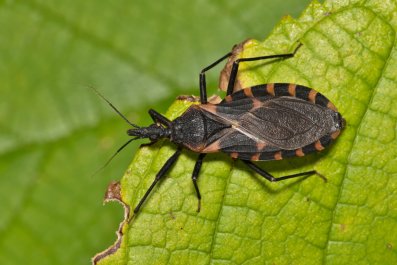Compulsive eaters may have a specific type of bacteria in their gut, research has found.
These bacteria—known as Proteobacteria—were found in large numbers in the guts of humans and mice with food addiction and in much lower populations in those without it, according to a study in the journal Gut, which is also being presented at the current Federation of European Neuroscience Societies (FENS) Forum 2024.
Read more: What Is a Health Savings Account?
In contrast, bacteria known as Actinobacteria decreased in food-addicted humans and mice, and increased in those without the addiction.
"A number of factors contribute to food addiction, which is characterized by loss of control over food intake and is associated with obesity, other eating disorders and alterations in the composition of bacteria in the gut—the gut microbiome," study co-author Elena Martín-García, a researcher at the Universitat Pompeu Fabra in Barcelona, Spain, said in a statement.
"Until now, the mechanisms underlying this behavioral disorder were largely unknown," she said.
Read more: Compare the Top Health Savings Account (HSA) Providers
Food addiction is a behavioral disorder characterized by an unhealthy relationship with food, where individuals exhibit compulsive eating behaviors similar to those seen in people with substance addiction. People suffering with it often experience a loss of control over their eating, craving certain foods and consuming them despite negative consequences to their health and well-being, such as obesity. Food addiction is somewhat of a controversial topic in the scientific world, as it is not included in the fifth edition of the Diagnostic and Statistical Manual of Mental Disorders (DSM-5).
The researchers used a measure known as the Yale Food Addiction Scale (YFAS 2.0), with the humans answering 35 questions and the mice being observed for signs of behaviors that indicate food addiction: persistent food-seeking, compulsive behavior and high motivation to obtain food.
They also investigated the gut microbiome of the humans and mice, and compared the populations of bacteria in the gut with the degree of food addiction. The results showed that there was an increase in Proteobacteria and a decrease in both Actinobacteria and another bacteria called Blautia in the food-addicted mice and humans.
"We have demonstrated for the first time a direct interaction between the gut composition and brain gene expression, revealing the complex and multifactorial origin of this important behavioral disorder related to obesity. Understanding the crosstalk between alterations in behavior and bacteria in the gut constitutes a step forward for future treatments for food addiction and related eating disorders," Martín-García said.
The researchers suggest that these bacteria could be used to treat compulsive eating. By increasing the levels of Blautia in the mice, they found that food addiction levels dramatically decreased.
"The findings in both mice and humans suggested that specific microbiota could be protective in preventing food addiction. In particular, the strong similarities in the amount of Blautia underlined the potential beneficial effects of this particular gut bacteria. Therefore, we investigated the protective effects of oral administration of lactulose and rhamnose, which are non-digestible carbohydrates known as 'prebiotics' that can increase the amount of Blautia in the gut," Martín-García said.
"We did this in mice and found that it led to an increase in the abundance of Blautia in mice feces in parallel with dramatic improvements in food addiction. We saw similar improvements when we gave the mice a species of Blautia called Blautia wexlerae orally as a probiotic."
The discovery that certain bacteria in the gut is non-beneficial while other bacteria could prevent food addiction could lead to treatments that help people avoid overeating, as well as treating eating disorders.
"While 'food addiction' is still a controversial concept, it is generally accepted that the compulsive intake of highly palatable, caloric foods can lead to eating disorders and promote obesity. This study has identified a specific microbiota signature associated with features of food addiction," Harriët Schellekens, a senior lecturer at University College Cork in Ireland who wasn't involved in the study, said in a statement.
"The abundance of the Blautia genus decreases as motivation and compulsive eating increases in both mice and humans. Importantly, supplementation with Blautia-promoting pre and probiotics lowers the number of mice classified as 'food addicted.'
"This study adds important evidence demonstrating that gut microbiota can indeed influence host eating behavior. This gives renewed confidence for future mechanistic and translational studies investigating gut microbiota in the context of eating disorders and their metabolic consequences," she said.
Do you have a tip on a science story that Newsweek should be covering? Do you have a question about food addiction? Let us know via science@newsweek.com.
Disclaimer: The copyright of this article belongs to the original author. Reposting this article is solely for the purpose of information dissemination and does not constitute any investment advice. If there is any infringement, please contact us immediately. We will make corrections or deletions as necessary. Thank you.




